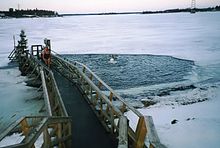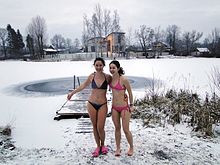
Back Zimní plavání Czech Vinterbadning Danish Winterbaden German Vintro-naĝado Esperanto Natación de hielo Spanish Talisuplus Estonian Avantouinti Finnish Renang musim dingin ID Nuoto invernale Italian 寒中水泳 Japanese
This article needs additional citations for verification. (January 2008) |


Winter swimming is the activity of swimming during the winter season, typically in outdoor locations (open water swimming) or in unheated pools or lidos. In colder countries, it may be synonymous with ice swimming, when the water is frozen over. This requires either breaking the ice or entering where a spring prevents the formation of ice. It may also be simulated by a pool of water at 0 °C (32 °F), the temperature at which water freezes.
In Nordic countries of Europe as well in Eastern Europe (e.g. Ukraine, Russia, and Baltic countries), winter swimming is a traditional cultural element and part of religious celebrations like the Epiphany in Eastern Orthodoxy.[citation needed]
Competitions for winter swimming also exist. Many winter swimmers swim with standard swimsuits rather than with wetsuits or other thermal protection. Famous ice and winter swimmers include Lynne Cox and Lewis Gordon Pugh.
Also, many locations in North America and Europe hold polar bear plunges, commonly to celebrate New Year's Day, although participants are not expected to swim and generally most do not swim.
International winter and ice swimming competitions take place around the world with two of the larger organizing bodies being the International Ice Swimming Association[1] and the International Winter Swimming Association.[2] Both organizations have similar competition guidelines including water temperatures typically below 5 °C (41 °F),[3] a 25 metres (82 ft) pool often cut out of frozen bodies of water, and swimmers limited to goggles, one standard bathing suit, and one latex or silicone cap - neoprene is not allowed.[4]
- ^ "International Ice Swimming Association - Home". www.internationaliceswimming.com. Retrieved 5 October 2017.
- ^ "IWSA - International Winter Swimming Association". iwsa.world. Retrieved 5 October 2017.
- ^ "Water Classification - International Winter Swimming Association". iwsa.world. Retrieved 5 October 2017.
- ^ "IISA RULES | IISA". www.internationaliceswimming.com. 21 January 2017. Retrieved 5 October 2017.